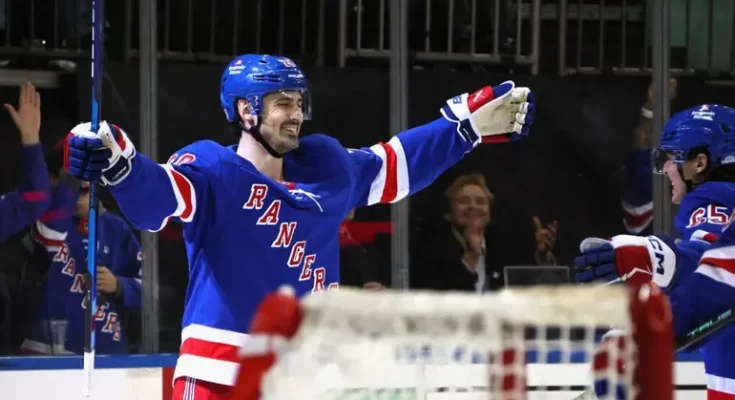Chris Kreider’s tenure with the New York Rangers is one that will long be remembered by fans and players alike. For over a decade, he embodied everything it meant to wear the Rangers sweater — grit, speed, leadership, and an unwavering loyalty to the city that never sleeps. But now, for the first time since his emotional departure, Kreider has opened up in a revealing one-on-one about the end of his iconic chapter in New York. His words, laced with honesty, humility, and gratitude, offer not only closure for fans but a rare insight into what it truly means to say goodbye to a franchise that became a second home.
When Kreider was drafted by the Rangers in the first round back in 2009, the expectations were high. A power forward with rare explosiveness and a nose for the net, he arrived in New York with a blend of athleticism and maturity that made him a fan favorite before he ever laced up his skates at Madison Square Garden. And once he did, Kreider quickly proved he was made for the spotlight. From clutch playoff performances to highlight-reel goals, he became a fixture in the lineup and a symbol of the team’s identity.
Over the years, Kreider witnessed countless changes within the Rangers organization. He played alongside and outlasted the likes of Henrik Lundqvist, Ryan McDonagh, Derek Stepan, and Rick Nash. He saw the team rise to the Stanley Cup Final in 2014, only to be stymied by the Los Angeles Kings. He endured heartbreaking playoff losses, coaching changes, front-office turnover, and a full-blown rebuild. Through it all, he never asked out, never let his game slip, and never stopped being the player Rangers fans could count on. He was the soul of the locker room and a consistent voice in the media when things went south.
So when news broke earlier this offseason that Kreider and the Rangers were parting ways, the hockey world collectively paused. It wasn’t just a roster move; it was the end of an era. In his first public sit-down since the announcement, Kreider didn’t shy away from the emotional weight of the decision. He admitted that leaving New York was one of the hardest choices he’s ever had to face — and one that still doesn’t feel entirely real.
“There’s a part of me that still thinks I’ll walk into the Garden tomorrow,” Kreider said with a quiet smile. “It’s been my life for so long, it’s hard to imagine anything else.”
According to Kreider, the departure wasn’t rooted in bitterness or discord. Rather, it was a mutual recognition that the time had come for a new chapter. With the Rangers looking to retool around their young core and Kreider approaching the twilight of his prime years, both sides knew that a clean break might be best — even if it was painful.
“I’ll never say a bad word about the Rangers,” Kreider emphasized. “This organization gave me everything — a platform, a city to grow in, and a chance to be part of something bigger than myself. I’m incredibly proud of what we built, even if we didn’t win it all.”
That humility has always been Kreider’s trademark. Despite putting up impressive numbers and reaching personal milestones — including becoming one of the few Rangers to score 50 goals in a season — he remained grounded. He deflected praise, shared credit, and focused on team goals above personal accolades. Teammates past and present have spoken glowingly about his mentorship and work ethic. He was the player young guys leaned on and veterans respected.
Kreider’s influence extended far beyond the ice. He was heavily involved in community outreach programs, made regular appearances at local hospitals, and used his platform to advocate for social justice and mental health awareness. He understood that being a Ranger was about more than just stats — it was about representing New York with class and compassion.
In his one-on-one conversation, Kreider reflected on the many memories he’ll carry with him from his time in blue. He spoke of his first goal, his playoff heroics, and the unforgettable roars of the Garden faithful. But perhaps most poignant was his recollection of the small moments — the locker room laughs, the silent rides home after tough losses, the hugs after big wins.
“You miss the guys more than anything,” Kreider admitted. “You form this bond that’s hard to describe. It’s a brotherhood. And I’ll always have love for those guys — even when we’re on opposite sides now.”
As for what comes next, Kreider remains tight-lipped. While he hasn’t officially announced his next team, rumors have linked him to several contenders looking for veteran leadership and playoff experience. Wherever he lands, there’s no doubt he’ll bring the same intensity and integrity that defined his Rangers career. But he knows nothing will quite replicate the energy of Madison Square Garden on a Saturday night.
“There’s nothing like it,” Kreider said. “That building breathes with you. It shakes when you score. It mourns when you lose. It’s alive. And to have been part of that — to have played there for as long as I did — it’s something I’ll carry forever.”
He also shared a special message for the fans — a group he credits with shaping him both as a player and a person. Kreider’s voice wavered slightly as he thanked the Rangers faithful for their unconditional support through good times and bad.
“They held me up when I was struggling, they pushed me to be better, and they celebrated every goal like it was their own,” he said. “I’m going to miss them more than I can say. I hope I made them proud.”
Kreider’s departure marks the latest in a series of transitions for the Rangers, a team caught between competing timelines. With a crop of emerging stars like Alexis Lafrenière, K’Andre Miller, and Braden Schneider stepping into larger roles, and veterans like Mika Zibanejad and Artemi Panarin still producing at high levels, New York remains in the mix. But Kreider’s absence will be deeply felt — not just in the goals column, but in the locker room, the media scrums, and the heartbeat of the franchise.
Even as fans mourn his departure, there’s a palpable sense of appreciation. Few players leave behind a legacy as complete and enduring as Kreider’s. He didn’t just play for the Rangers — he became a Ranger in every sense of the word. His name belongs in the same breath as the greats who came before him, and his number may one day hang from the rafters as a testament to his impact.
In the final moments of his interview, Kreider offered one last thought — a quiet but powerful summary of what the Rangers meant to him.
“I came to New York as a kid chasing a dream,” he said. “I’m leaving as a man who lived it. And I wouldn’t trade a single second.”
There are many ways to define greatness in sports — championships, records, accolades. But for Chris Kreider, his greatness lies in the respect he earned, the teammates he inspired, and the unbreakable bond he formed with a city that became his home. His story with the Rangers may have ended, but his legacy is only beginning. And for the millions who watched him give everything for the sweater, that legacy is more than enough.



